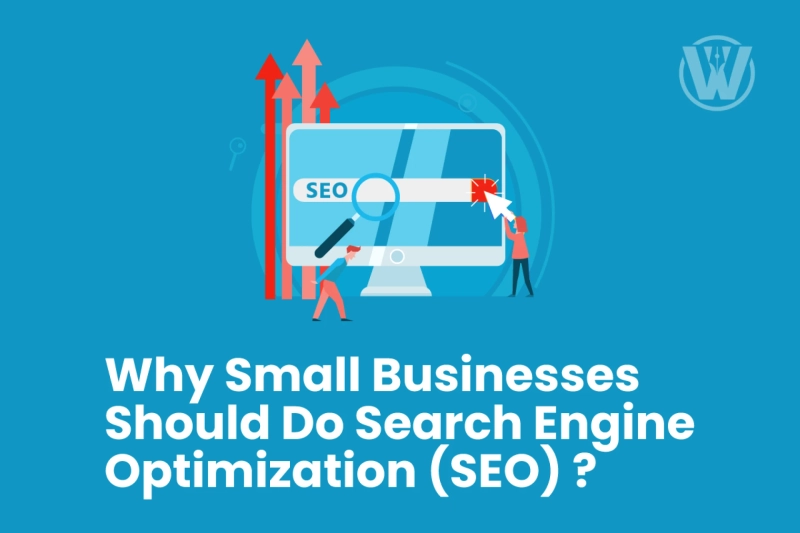Small business owners have a lot on their plate. They’re responsible for managing their staff, improving their products or services and overseeing their finances. Some of these entrepreneurs may feel overwhelmed at the amount of tasks they need to work on and think that search engine optimization (SEO) isn’t a priority.
If you’re a small business owner, however, you need to use SEO to your advantage. A well-managed SEO campaign can deliver long-lasting results by improving your company’s online visibility and helping grow your revenue.
Why Small Businesses Should Do SEO?
Here are compelling reasons to implement this digital marketing strategy for your small business:
Boosts Brand Awareness
A major advantage of achieving higher rankings on search engine pages (SERPs) is building brand recognition. When your business website shows up on page one of major search engines, such as Google, Bing and Yahoo!, your prospective customers are more likely to trust your brand when they look for a particular term.
Evens Out the Playing Field
Small businesses could potentially be competing with large corporations and other businesses down the block. Let’s say you’re running a law firm. How do you compete with the other law firms in your city?
Search engine optimization gives you the opportunity to even out the playing field. If someone searched for a law office in Dallas, for instance, having an optimized site enables your law firm to show up within the same search results where you’ll find the larger law offices.
By implementing SEO for your law firm (or whatever business you run in your city), you can compete with the big companies by giving your business visibility to clients or customers. This allows you to grab market share from the larger competitors.
Generates Well-Qualified Customers Without Breaking the Bank
Some businesses turn to traditional marketing approaches, such as TV advertising, to get customers into their establishment.
A TV commercial for your company can cost a fortune. According to a report from Fit Small Business, the average cost of a 30-second commercial aired on a national network is a whopping $115,000. This is on top of production costs, which is around $2,000 to $5,000 on the low end.
Expensive, unfortunately, doesn’t always mean effective.
Even if you air a good TV commercial, there’s a chance that only a small segment of your target market would qualify as your prospective customer. This isn’t the case with search engine optimization.
SEO connects you directly to qualified customers, allowing you to reach your target market without the big cost.
What’s more, organic traffic usually contributes to the biggest share of visitors to a business website. This is why it’s crucial to optimize your site for search engines. Neglecting this step stops you from obtaining your share of qualified visitors along with the potential revenue you could get from those visits.
Positively Impacts the Buying Cycle
Customers do their homework before buying a product or a service. According to a report from Retail Dive, 87 percent of shoppers start their product search online.
Using effective SEO strategies to relay your brand messaging for groundbreaking products or services and good deals will be a game changer for your company. These tactics will positively affect the purchasing cycle when implemented properly.
Here’s why: your company needs to be visible when your prospective customers are in research mode.
Your brand needs to offer the best possible product or service for your customers’ needs at the exact moment they come looking for it. When you execute the right SEO tactics, your brand will be visible to potential customers. This signifies that you’re present and ready to help them with their needs.
Improves Conversion Rates
Websites that have undergone SEO optimization load quicker. They also show up properly in nearly all types of devices and are easy to navigate and read. These kinds of websites are more likely to attract and hold the attention of your users. This means that they are more likely to become a returning visitor, a subscriber or a loyal customer.
How Small Businesses Can Get Started with SEO
Small business owners have two options when they want to optimize their website to make it search engine friendly.
The first is to solicit SEO services from a trusted digital marketing agency. This is ideal if you have the money but are short on time.
Your second option is to implement SEO tactics on your own. If you’re thinking of taking a DIY approach to search engine optimization, keep in mind the following suggestions:
Perform Keyword Research
You should not start your SEO strategy creation process or modify your website without first looking for search terms that are relevant to the product or service of your company.
Figure out what prospective customers are typing in Google and other search engines to find your service or product. You’ll also learn how often people use these keywords along with the ranking difficulty associated with these search terms. By doing sound keyword research, you’ll obtain a general idea of the amount of traffic you can attract to your business website.
If you’re conducting keyword research for the first time, begin by targeting high-volume keywords or search terms with low to medium competition. Use keyword research tools, such as Google Search Console, Google Keyword Planner, Mangools and Ahrefs Keywords Explorer, to help you obtain the search terms you need.
Understand Your Competition
Identify your organic search competitors. This includes the websites that offer the exact products and services, as well as massive retailers that compete for the same search terms.
Then, address the following guide questions:
How do these businesses engage shoppers or visitors?What are they doing to rank well in organic search?How do these competitors structure their website to zero in on valuable keywords?What content themes have they included on their website?Competitive analysis is an important step in the SEO strategy creation process. Rather than guess which keywords to target, links to build and content to create, you can instead look at what’s already working for your competitors and build upon that success.
Leverage Online Directories
Submit your contact details and other relevant information about your company to online business directories, such as Apple Maps Connect and Google My Business, with backlinks to your website. These directories will display the details of your business when customers in your local area search for a product or service you offer using a navigation app.
Produce Fresh Content Regularly
Write regular, quality content customized to your target audience. You don’t necessarily have to publish a fresh blog post or other types of content every day. Instead, post unique content once a month, twice a week or once a week. The important thing is that you’re consistent with your post frequency.
“Content” is not just limited to text. It also covers visual or aural elements. So you can produce how-to videos, add product photos to your web pages, place relevant illustrations and use other forms of content that inform as well as entertain visitors.
Here’s another tip: make sure that the content you produce for your website delivers value to your readers or prospective customers. They should engage your prospects or customers, or solve their needs or concerns.
Update Your Meta Tags
Create compelling meta titles and meta descriptions on your small business website.
The meta title tag sets the name of the browser tab. Major search engines, such as Google and Bing, use it when displaying the page of a website in the search results. This meta tag is an excellent opportunity to produce a headline that includes the search term you want the page to rank for and compels searchers to check out your website.
Conventional wisdom dictates that the length of your meta title should not go over 60 characters. The search engine may cut or truncate your meta tag if it’s too long.
Besides the meta title, you need to update your site’s meta description. This tag attracts readers to your website from a search results page. Creating a persuasive and readable description using important keywords can boost the click-through rate for a particular webpage.
Optimize Your Images
You’ll want Google and the other search engines to understand the images you’re using on your website. You can do this by adding the appropriate description on the alt tag. If you’re using WordPress, you can edit this tag by filling out the Alternative Text field.
Pro-tip: when writing your alt text, focus on creating information-rich and useful content that uses keywords appropriately. Doing so can contribute to a better user experience.
Track Your SEO Success
Equally important to setting up a strategy is determining how you will track your performance. If you’re doing this for the first time, start measuring the basics. The two vital metrics of SEO are the average ranking position of the keywords you’re targeting and organic traffic. You’ll need to have a basic understanding of Google Analytics (or a similar platform) to figure out the pages that are performing strongly along and determine areas for improvement.
Your small business gains searchability and visibility with search engine optimization — without the big cost. In achieving both, you’ll experience greater brand recognition, better sales and more customers. The key here is to work at it consistently. In time, effective SEO will help you acquire that sought-after competitive edge, sustaining your business for years to come.
Itamar Gero (Guest Author)
Author Bio: Itamar Gero is the founder and CEO of SEOReseller.com, a white label SEO company and digital marketing solutions provider that empowers agencies and retail—and their local business clientele—all over the world. When he isn’t working, he’s traveling the world, meditating, or dreaming (in code).



